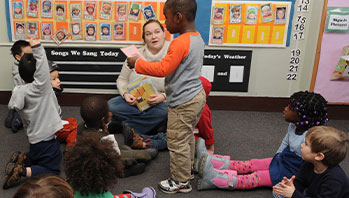- blank word cards
- sentence chart
- word cards: Sam, saw, Sue’s, seed, sprouting
MA Standards:
Speaking and Listening/SL.PK.MA.2: Recall information for short periods of time and retell, act out, or represent information from a text read aloud, a recording, or a video (e.g., watch a video about birds and their habitats and make drawings or constructions of birds and their nests).
Foundational Skills/RF.PK.MA.2.c: Identify the initial sound of a spoken word and, with guidance and support, generate several other words that have the same initial sound.
Head Start Outcomes:
Literacy Knowledge/Alphabet Knowledge: Recognizes that the letters of the alphabet are a special category of visual graphics that can be individually named.
Literacy Knowledge/Phonological Awareness: Identifies and discriminates between sounds and phonemes in language, such as attention to beginning and ending sounds of words and recognition that different words begin or end with the same sound.
PreK Learning Guidelines:
English Language Arts/Reading and Literature 7: Develop familiarity with the forms of alphabet letters, awareness of print, and letter forms.
English Language Arts/Reading and Literature 8: Listen to, identify, and manipulate language sounds to develop auditory discrimination and phonemic awareness.
Word Play: Alliteration (/s/)

© Commonwealth of Massachusetts, Department of Early Education and Care (Jennifer Waddell photographer). All rights reserved.
ELA Focus Skills: Concepts of Print, Letter Recognition, Phonological Awareness, Speaking and Listening, Vocabulary
Educator Prep: Prepare a sentence chart with individual words on cards to make up the following sentence: Sam saw Sue’s seed sprouting.
Display the sentence chart. Read it aloud for children as you track the words.
- Tell children that you want them to say the sentence with you.
- Ask, What letter does each word in this sentence begin with? Then have children say the sentence fast along with you.
- Ask, Did you get all twisted up when you tried to say it fast?
- Explain that sentences that have words that start with the same letter are hard to say when you say them fast. Tell children they are called tongue twisters because your tongue gets all twisted up!
Have children dictate or write other “Ss” words to make up new “Ss” sentences and repeat the activity.
Adaptation: With very young children, you may wish to simply say the alliterative sentences slowly with them and not do the tongue twisting, which might become frustrating for some.
